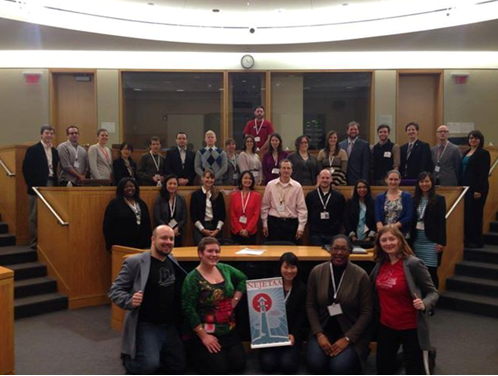The New England chapter of JETAA USA hosted a regional conference on January 11th and 12th at Harvard University’s Edwin O. Reischauer Institute of Japanese Studies. There were representatives from 15 US chapters and one Canadian chapter in attendance, as well as the three US Country Representatives and a member of the JETAA USA Board of Advisors. The conference was co-sponsored by JLGC, CULCON, the US-Japan Bridging Foundation, and the Consulate General of Japan in Boston.
The main theme of the conference was Membership Management, and sessions dealt with various issues related to this including capacity-building for national level initiatives, strengthening the chapters’ ability to recruit and serve members through better technology and practices, and developing subchapters and other mechanisms for improving engagement with alumni who cannot easily participate in chapter activities because of geographical distance or other issues.
Besides calling on the expertise of several of the alumni representatives, sessions also featured speakers from the USJBF, the executive director of the Japan Society of Boston, and leaders from the alumni organizations for Teach for America, the University of Michigan Club of Greater Boston, and AmeriCorps (many of whom are also JET alumni, actually).
Building on work done at the US National Conference, held this past September in Minneapolis, the regional conference gave everyone the opportunity to focus on what many felt to be the most pressing issues facing chapters currently – developing strategies, activities, and technological solutions in order to find, attract, and retain chapter members, strengthening the chapters and the North American alumni network as a whole. Information exchanged at the conference will now be taken back to each chapter, and we are hoping the ideas discussed will be adopted, as appropriate, as the Canadian and US chapters prepare for their respective 2014 national conferences.

Matthew Gillam, Senior Researcher


